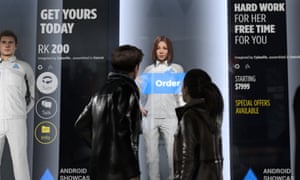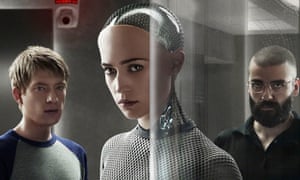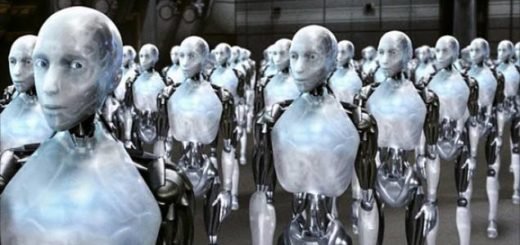Androids
As our dependence on technology builds and the privacy-destroying, brain-hacking consequences of that start to come to light, we are seeing the return of a science-fiction trope: the rise of the robots. A new wave of television shows, films and video games is grappling with the question of what will happen if we develop the technology to create machines in our own image.
Westworld posits that if we could develop realistic androids, we would want to rape and murder them for fun. In Blade Runner 2049, they have replaced humans as sex workers and manual laborers. In the recently released video game Detroit: Become Human, androids are nannies, carers and even pop stars, omnipresent in the home and in city life.
The current wave of android fiction centers on what happens when the line between human and machine becomes blurred. At what point do robots deserve rights: when they reach a certain level of intelligence, or when they develop the capacity for emotion, creativity or free will? In the cold war, when we believed that machines might kill us any minute in the shape of nuclear bombs, our nightmare robots were relentless killing machines such as The Terminator or RoboCop – or the pitiless military droids that hunt down the last remnants of humanity in Metal head, a recent episode of Black Mirror. Now that technology has enmeshed itself in our lives, it is dawning on us that machines can take over in another way – by encroaching on our humanity.

Just a few weeks ago, Google demonstrated that its home-assistant robot is capable of holding an unsettlingly natural conversation with a human being over the phone to book a haircut or make a restaurant reservation, complete with “ums” and “ahs” to make the listener believe they are talking to a real person.
We are increasingly worried about what will happen if machines become just like us. Adam Williams, lead writer on the game Detroit: Become Human, thinks that the development of human-like emotion is more unsettling than the idea of straightforward robot antagonism. “It’s a more subtle threat to the sanctity of the human category,” he says. “Emotion is something we reserve for ourselves: depth of feeling is what we use to justify the primacy of human life. If a machine is capable of feeling, that doesn’t make it dangerous in a Terminator-esque fashion, but in the abstract sense of impinging on what we think of as classically human.”
Anouk van Maris, a robot cognition specialist who is researching ethical human-robot interaction, has found that comfort levels with robots vary greatly depending on location and culture. “It depends on what you expect from it. Some people love it, others want to run away as soon as it starts moving,” she says. “The advantage of a robot that looks human-like is that people feel more comfortable with it being close to them, and it is easier to communicate with it. The big disadvantage is that you expect it to be able to do human things and it often can’t.”
In Japan, where the animus belief perhaps makes people more comfortable with the idea that spirit can reside in something that isn’t human, robots are already being used as shop assistants, in care homes and in schools. Japan is the world leader in robotics and demand is high for robots that could help fill a shortfall in nursing care. The country is home to the creepy Erica, the most realistic female humanoid in existence, and Gatebox AI’s Azuma, a holographic girl in a jar that combines Alexa-like home-assistant functionality with a cute anime look and a simulated, deferential personality.
“A machine can exhibit human-like qualities and not be considered particularly controversial if it doesn’t look human,” says Williams. “That’s what is intriguing. What scares people about that Google Assistant phone call is that it sounds human. The fact that it can construct the conversation is not what scares people – it’s the fact they can’t distinguish it from a real person.”

On the evidence of Westworld, Detroit: Become Human and Ex Machina – none of which paint the most optimistic portrait of human-android relations – perhaps we will all be better off if our future robot assistants are more Wall-E or R2-D2 in Star Wars than Star Trek’s Data or Blade Runner’s Pris.















